French singer, actor and librettist Henri Allibert (1889-1951), known as Alibert, was the Marseille singer par excellence. During the 1930s and 1940s, he starred in his own very popular operettas both on stage and on the screen.
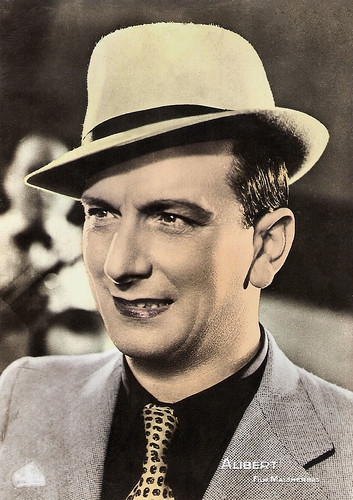
French card by Massilia. Photo: Film Malsherbes. Publicity still for Titin des Martigues (René Pujol, 1938).
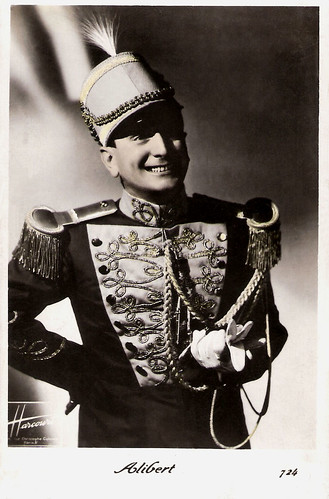
French postcard, no. 724. Photo: Studio Harcourt, Paris.
Henri Allibert (with a double l) was born in 1889 in Carpentras in the south of France. When he was 15 his parents divorced and his mother and the children settled in Avignon.
He began to sing in the cafes where he worked as a waiter. In 1907, he made his debut as a singer at the Palace and in the cafes-concerts of Avignon, and in 1908 he moved to Paris where he appeared at the Bobino music hall.
As Alibert (with one l) he created a 'tour de chant', imitating the singers Polin and Mayol. He married pianist Elisa Rosalie Espanet in Marseille in 1913. She was the daughter of composer Vincent Scotto.
In 1914, Alibert was recruited for the army and in 1917, he returned with a decoration. After the First World War, he enjoyed the post-war euphoria and his revues became popular. He recorded the song Jazz band partout (Jazz band everywhere).
His career accelerated in 1928, when his father-in-law, Vincent Scotto gave him the song Mon Paris (My Paris), which showed his genuine talent and undeniable charm. In 1929, Marcel Pagnol wrote his play Marius, situated in Marseille and the harbour city was suddenly all the rage.
With two other men from Marseilles, his father-in-law Vincent Scotto and arranger-conductor René Sarvil, Alibert wrote and assembled the Revue Marseillaise to enjoy the fashion. This revue remained seven months prolonged in the theatre and was an unprecedented success. It meant Alibert’s definitive breakthrough, at the age of 40.
Then, Alibert starred in the Marseille-set operetta Elle est à nous (She is ours, 1929) created by Scotto, Sarvil and Alibert. With his clear voice and his light accent, he received the title of 'Marseille singer par excellence'. In the next years followed such operettas as Au pays du soleil (In the land of the sun, 1932), Arènes joyeuses (Happy Arenas) and Trois de la Marine (Three of the Navy, 1935).
In 1930 he had made his film debut in the early sound film Cendrillon de Paris/Cinderella of Paris (Jean Hémard, 1930), featuring Colette Darfeuil. His operetta Au pays de soleil was also made into a film, Au pays du soleil/In the land of the sun (Robert Péguy, 1934) in which he also starred opposite Lisette Lanvin and Pola Illéry. It was again a success.
From then on he made two operettas or films a year. His stage operettas include Un de la Canebière (One of the Canebieres, 1936), Les Gangsters du château d'If (1937), and Le Roi des galéjeurs (The king of the galleys, 1938).
His films were Trois de la marine/Three of the Navy (Charles Barrois, 1934) with Armand Bernard and Betty Stockfeld, Arènes joyeuses/Happy Arenas (Karl Anton, 1935) with Lucien Baroux, Titin des Martigues (René Pujol, 1937) with Paulette Dubost, Un de la Canebière/One from the Canebière (René Pujol, 1937) with Rellys, La Vie des artistes/Artist Life (Bernard Roland, 1938), and Les Gangsters du château d'If/The Gangster of If Castle (René Pujol, 1939).
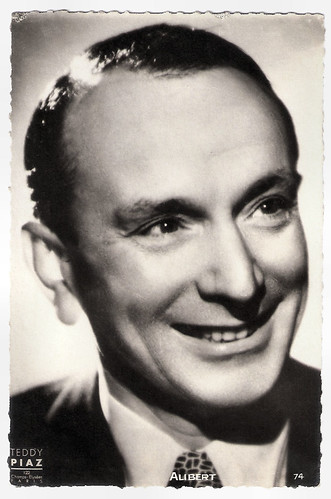
French postcard by Editions O.P., Paris, no. 74. Photo: Teddy Piaz, Paris.
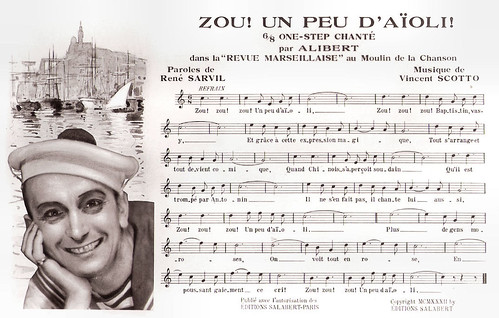
French card by P.C., Paris, no. 38. Henri Alibert sang the song Zou! Un peu dáïoli! (1932) by René Sarvil and Vincent Scotto in the Revue Marseillaise at the Moulin de la Chanson.
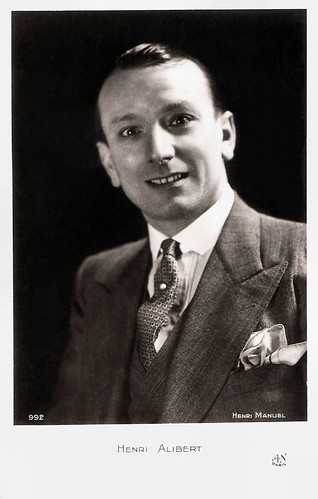
French postcard by A.N., Paris, no. 992. Photo: Henri Manuel.
Henri Allibert’s creational pace was barely slowed down during the Second World War. He created the operettas Ma Belle Marseillaise (1940), Port du Soleil (1941) and Les Gauchos de Marseille (1943), but made only one film, Le Roi des galéjeurs/The king of the galleys (Fernand Rivers, 1940) with Raymond Aimos and Claude May.
In 1946 Alibert starred in two more films, Au pays des cigales/In the land of the cicadas (Maurice Cam, 1946) with Nicolas Amato, and L'Affaire du Grand Hôtel/The Grand Hotel Affair (André Hugon, 1946) with Édouard Delmont.
The post-war period challenged the old school to which he belonged. He decided to devote himself entirely to his talents as a writer, lyricist and composer, and even became director of the Théâtre des Deux Ânes.
On stage he played the role of Marius in Marcel Pagnol's play Caesar. In 1951, his operetta Au pays du soleil was again made into film Au pays du soleil/In the land of the sun (Maurice de Canonge, 1951) with Tino Rossi in the leading role.
In 1949, Alibert was the victim of a serious car accident from which he never really recovered.
Henri Allibert died 1951 in Marseille at the age of 61 years. He was buried in Marseille, in the cemetery of Saint-Pierre. His wife was Antoinette Scotto.
After his death, several film versions of Alibert’s operettas were made including Trois de la Canebière (Maurice de Canonge, 1956) with Marcel Merkes, and Arènes joyeuses (Maurice de Canonge, 1958), starring Fernand Raynoud and Danielle Godet.
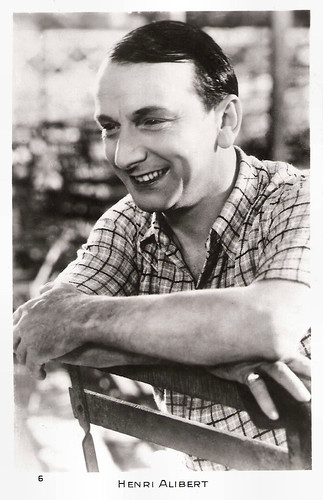
French postcard, no. 6.
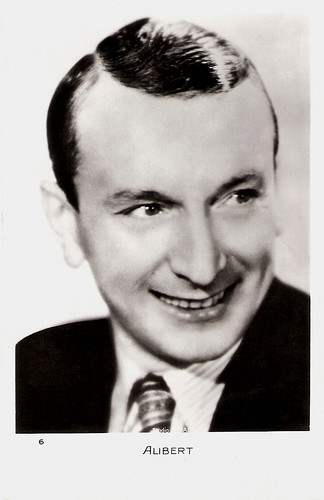
French postcard by Edition Chantal, Paris, no. 6. Photo: Studio Arnal.
Sources: Gerard Frappé (CinéArtistes - French), La Comédie musicale en France (French), Du temps des cerises aux feuilles mortes (French), Le Hall de la Chanson (French), Wikipedia (French) and IMDb.

French card by Massilia. Photo: Film Malsherbes. Publicity still for Titin des Martigues (René Pujol, 1938).

French postcard, no. 724. Photo: Studio Harcourt, Paris.
The rage of Marseille
Henri Allibert (with a double l) was born in 1889 in Carpentras in the south of France. When he was 15 his parents divorced and his mother and the children settled in Avignon.
He began to sing in the cafes where he worked as a waiter. In 1907, he made his debut as a singer at the Palace and in the cafes-concerts of Avignon, and in 1908 he moved to Paris where he appeared at the Bobino music hall.
As Alibert (with one l) he created a 'tour de chant', imitating the singers Polin and Mayol. He married pianist Elisa Rosalie Espanet in Marseille in 1913. She was the daughter of composer Vincent Scotto.
In 1914, Alibert was recruited for the army and in 1917, he returned with a decoration. After the First World War, he enjoyed the post-war euphoria and his revues became popular. He recorded the song Jazz band partout (Jazz band everywhere).
His career accelerated in 1928, when his father-in-law, Vincent Scotto gave him the song Mon Paris (My Paris), which showed his genuine talent and undeniable charm. In 1929, Marcel Pagnol wrote his play Marius, situated in Marseille and the harbour city was suddenly all the rage.
With two other men from Marseilles, his father-in-law Vincent Scotto and arranger-conductor René Sarvil, Alibert wrote and assembled the Revue Marseillaise to enjoy the fashion. This revue remained seven months prolonged in the theatre and was an unprecedented success. It meant Alibert’s definitive breakthrough, at the age of 40.
Then, Alibert starred in the Marseille-set operetta Elle est à nous (She is ours, 1929) created by Scotto, Sarvil and Alibert. With his clear voice and his light accent, he received the title of 'Marseille singer par excellence'. In the next years followed such operettas as Au pays du soleil (In the land of the sun, 1932), Arènes joyeuses (Happy Arenas) and Trois de la Marine (Three of the Navy, 1935).
In 1930 he had made his film debut in the early sound film Cendrillon de Paris/Cinderella of Paris (Jean Hémard, 1930), featuring Colette Darfeuil. His operetta Au pays de soleil was also made into a film, Au pays du soleil/In the land of the sun (Robert Péguy, 1934) in which he also starred opposite Lisette Lanvin and Pola Illéry. It was again a success.
From then on he made two operettas or films a year. His stage operettas include Un de la Canebière (One of the Canebieres, 1936), Les Gangsters du château d'If (1937), and Le Roi des galéjeurs (The king of the galleys, 1938).
His films were Trois de la marine/Three of the Navy (Charles Barrois, 1934) with Armand Bernard and Betty Stockfeld, Arènes joyeuses/Happy Arenas (Karl Anton, 1935) with Lucien Baroux, Titin des Martigues (René Pujol, 1937) with Paulette Dubost, Un de la Canebière/One from the Canebière (René Pujol, 1937) with Rellys, La Vie des artistes/Artist Life (Bernard Roland, 1938), and Les Gangsters du château d'If/The Gangster of If Castle (René Pujol, 1939).

French postcard by Editions O.P., Paris, no. 74. Photo: Teddy Piaz, Paris.

French card by P.C., Paris, no. 38. Henri Alibert sang the song Zou! Un peu dáïoli! (1932) by René Sarvil and Vincent Scotto in the Revue Marseillaise at the Moulin de la Chanson.

French postcard by A.N., Paris, no. 992. Photo: Henri Manuel.
Old School
Henri Allibert’s creational pace was barely slowed down during the Second World War. He created the operettas Ma Belle Marseillaise (1940), Port du Soleil (1941) and Les Gauchos de Marseille (1943), but made only one film, Le Roi des galéjeurs/The king of the galleys (Fernand Rivers, 1940) with Raymond Aimos and Claude May.
In 1946 Alibert starred in two more films, Au pays des cigales/In the land of the cicadas (Maurice Cam, 1946) with Nicolas Amato, and L'Affaire du Grand Hôtel/The Grand Hotel Affair (André Hugon, 1946) with Édouard Delmont.
The post-war period challenged the old school to which he belonged. He decided to devote himself entirely to his talents as a writer, lyricist and composer, and even became director of the Théâtre des Deux Ânes.
On stage he played the role of Marius in Marcel Pagnol's play Caesar. In 1951, his operetta Au pays du soleil was again made into film Au pays du soleil/In the land of the sun (Maurice de Canonge, 1951) with Tino Rossi in the leading role.
In 1949, Alibert was the victim of a serious car accident from which he never really recovered.
Henri Allibert died 1951 in Marseille at the age of 61 years. He was buried in Marseille, in the cemetery of Saint-Pierre. His wife was Antoinette Scotto.
After his death, several film versions of Alibert’s operettas were made including Trois de la Canebière (Maurice de Canonge, 1956) with Marcel Merkes, and Arènes joyeuses (Maurice de Canonge, 1958), starring Fernand Raynoud and Danielle Godet.

French postcard, no. 6.

French postcard by Edition Chantal, Paris, no. 6. Photo: Studio Arnal.
Sources: Gerard Frappé (CinéArtistes - French), La Comédie musicale en France (French), Du temps des cerises aux feuilles mortes (French), Le Hall de la Chanson (French), Wikipedia (French) and IMDb.
No comments:
Post a Comment